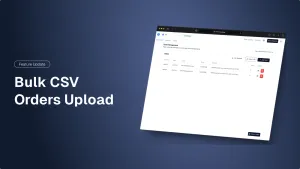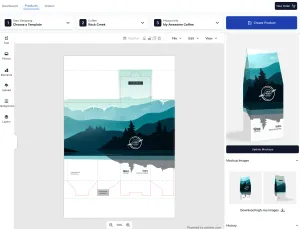Can You Sell Coffee from Home? We Did the Research For You!

Introduction
Dreaming of running your own business from the comfort of your home? You might be surprised to learn that coffee, one of the most beloved beverages worldwide, can kickstart this entrepreneurial pursuit.
This article aims to guide you through every essential step - from establishing an online coffee shop, sourcing quality beans, to effective marketing and delivering irresistibly brewed cups right at customers’ doorsteps.
Let’s embark on a journey towards brewing profits!
Key Takeaways
- Selling coffee from home is a viable business opportunity that requires minimal upfront investment and holds potential for significant profits.
- Operating an online coffee business offers advantages such as convenience, flexibility, and lower operating costs compared to traditional brick-and-mortar stores.
- To be successful in selling coffee from home, it is crucial to identify and understand your target market, develop a unique brand image, and establish a strong online presence.
Can You Sell Coffee From Home?
Absolutely, selling coffee from home has become a viable business opportunity. In fact, it’s a low-risk venture that requires minimal investment upfront but still holds potential for significant profits.
Thanks to the digital age and the growth of e-commerce platforms, you can setup an online coffee store with ease, reaching out to millions of coffee lovers across the globe right from your living room.
And not just this, operating an online coffee business brings down any expensive overheads associated with traditional brick-and-mortar stores such as rental and insurance costs.
However, transitioning from brewing your favorite cuppa at home to running a profitable online coffee business isn’t without challenges. Creating a strong brand image that resonates with your target audience is key for standing out in this saturated market.
Additionally, sourcing quality beans from reliable suppliers who cater to small businesses is crucial in defining your product offerings’ taste and uniqueness. From roasting raw beans to packaging them attractively while ensuring customer satisfaction - there’s much more involved than meets the eye when selling coffee from home!
Advantages of Selling Online
Selling coffee online offers potential for revenue generation, convenience and flexibility, and lower operating costs.

Potential for Revenue Generation
The potential for revenue generation from selling coffee online is substantial. It’s no secret that the global demand for coffee is endlessly growing, making it a viable option for a profitable business venture.
The convenience and speed of buying online has only boosted this demand, with customers relishing the opportunity to try various specialty coffees from the comfort of their homes. This means ample opportunities for entrepreneurs passionate about coffee to turn that passion into profits.
To capitalize on this lucrative market trend, consider offering an extensive range of products including whole bean options, ground coffee bags, single-serve pods or even related accessories like mugs or T-shirts as part of your inventory selection.
Expanding product offers creates additional sources of income, thereby escalating revenue potential. Remember not all profits stem directly from just selling bagged roasted beans — by diversifying your offerings you can cater to a broad spectrum of customer preferences and increase sales volume at relatively low overhead costs.
Convenience and Flexibility
Selling coffee from home presents a remarkable convenience and flexibility that’s hard to match with traditional business models. With an online setup, you’re not bound by the conventional 9-to-5 schedule or tied to a specific location - your home-based coffee store could be up and running 24/7.
This allows you to serve customers across different time zones and geographical locations without any hurdles. Plus, it lends itself perfectly well to individuals balancing other jobs, academic pursuits or personal commitments alongside their entrepreneurial ambitions.
Providing high-quality coffee products at the click of a button offers unparalleled ease for both you as the seller and your customer base.
Lower Operating Costs
One of the key advantages of selling coffee online from home is the significantly lower operating costs compared to traditional brick-and-mortar businesses. With an online coffee business, you don’t need to worry about expensive commercial space or hefty insurance premiums.
This means more money in your pocket and higher profit margins. Additionally, you won’t have to invest in costly coffee equipment or hire additional staff, further reducing your overhead expenses.
By eliminating these financial burdens, you can focus on providing great quality coffee at competitive prices while maximizing your profitability.
Identifying Your Target Coffee Consumer (ie Your Market)
To run a successful online coffee business from home, it’s crucial to identify your target coffee consumer or market. Understanding who your customers are will allow you to tailor your products and marketing strategies specifically to their preferences and needs.
Start by conducting thorough market research to analyze the demographics, interests, and purchasing habits of coffee enthusiasts. Consider factors such as age, gender, location, income level, and lifestyle choices.
This information will help you develop a clear picture of your target audience.
Additionally, consider the specific niche within the coffee industry that you want to focus on. Are you targeting specialty coffee lovers who appreciate single-origin beans? Or perhaps health-conscious consumers looking for organic or fair trade options? By narrowing down your target market, you can position your brand more effectively and stand out among competitors.
Remember that understanding your target audience goes beyond demographics - it also involves knowing their motivations and desires when it comes to drinking coffee. Do they value convenience? Are they willing to pay a premium for high-quality beans? By answering these questions, you can create an appealing value proposition that resonates with potential customers.
Overall, identifying your target coffee consumer is essential in defining your brand voice and developing effective marketing strategies that ultimately drive sales for your online business from home.
Determining Your Business Model
To successfully sell coffee from home, it’s crucial to determine your business model. This involves deciding how you will operate and generate revenue in the online coffee market. One popular option is dropshipping, where you partner with a reliable coffee supplier who handles storage, packaging, and shipping of the products directly to customers.
Another approach is private labeling, where you source high-quality roasted coffee beans and create your own brand for resale.
When determining your business model, it’s important to consider factors such as your target audience, product offerings, and profit margins. Conduct thorough market research to identify trends and customer preferences that can guide your decision-making process.
By understanding what sets you apart from competitors and offering unique products or services such as specialty blends or organic options - you can carve out a niche in the competitive coffee industry.
Remember that building a successful online coffee business takes time and strategic planning. Ensure that you have clear goals in terms of sales targets and profitability while keeping up with industry standards like FDA regulations related to selling food items online.
By utilizing effective marketing strategies like social media campaigns or video content creation along with exceptional customer service practices - entrepreneurs can position themselves for success in this growing market segment..
Branding Your New Coffee Business
Developing a unique brand image and establishing a strong online presence are vital for successfully branding your new coffee business.
Developing a Unique Brand Image
Creating a unique brand image is crucial for establishing your coffee business and standing out in the competitive online market. Your brand image encompasses everything from your logo and color scheme to your company’s values and personality.
By developing a strong brand identity, you can connect with your target audience on a deeper level and differentiate yourself from other coffee businesses. Research industry trends and understand what appeals to your customers to create visuals that resonate with them.
Remember, branding isn’t just about aesthetics; it’s about communicating the essence of your business through every touchpoint, both online and offline. With a well-defined brand image, you can build brand loyalty, establish authenticity, and attract customers who align with your vision.
Establishing a Strong Online Presence
To sell coffee successfully online, it’s crucial to establish a strong online presence. This will help build brand recognition, attract customers, and set your business apart from the competition. Here are some essential steps to follow when establishing your online presence:
1. Develop a visually appealing website: Create a user-friendly website that reflects your brand’s personality and showcases your coffee products effectively. Use high-quality images, engaging product descriptions, and easy navigation to enhance the user experience.
2. Optimize your website for search engines: Conduct keyword research to identify relevant terms that potential customers might use when searching for coffee online. Incorporate these keywords into your website content, including product descriptions, blog posts, and metadata, to improve your search engine rankings.
3. Engage with customers on social media: Leverage social media platforms like Facebook, Instagram, and Twitter to connect with your target audience. Share compelling visual content related to coffee, engage with followers through comments and direct messages, and promote special offers or new product launches.
4. Utilize video marketing: Videos are highly engaging and can help you showcase the unique aspects of your coffee business effectively. Create videos demonstrating brewing techniques, behind-the-scenes footage of roasting processes, or customer testimonials to build trust and connect with potential buyers.
5. Collaborate with influencers or bloggers: Partnering with influencers or popular bloggers in the food and beverage industry can help you reach a wider audience and boost brand awareness. Consider offering free samples in exchange for honest reviews or endorsements from these influencers.
6. Implement email marketing campaigns: Build an email list by offering incentives for visitors to sign up on your website (such as exclusive discounts or free e-books). Send regular newsletters featuring updates about new products, promotions, brewing tips, or educational content related to coffee.
7. Offer exceptional customer service: Provide prompt responses to customer inquiries via email or social media channels. Resolve any issues promptly and proactively address feedback or complaints to maintain a positive online reputation.
8. Monitor and analyze website traffic: Use analytics tools like Google Analytics to track your website’s performance and understand how users are interacting with your site. This data can help you make informed decisions on areas for improvement and identify successful marketing strategies.
Setting Up Your Online Coffee Store
To set up your online coffee store, create a user-friendly website and choose the right e-commerce platform with features that support your business needs.
Creating a User-Friendly Website
To successfully sell coffee online, it’s crucial to create a user-friendly website that not only attracts customers but also keeps them engaged and encourages them to make a purchase. Here are some essential elements to consider when designing your coffee business website:
1. Clear and Intuitive Navigation: Make sure your website is easy to navigate so that visitors can quickly find the information they need and navigate your product offerings effortlessly.
2. Responsive Design: With the increasing use of mobile devices, it’s important to have a responsive website design that adapts seamlessly to different screen sizes. This ensures that users can access your site and make purchases from any device.
3. High-Quality Product Images: Use high-resolution images of your coffee products to showcase their quality and appeal. Visuals play a crucial role in capturing the attention of potential customers.
4. Detailed Product Descriptions: Provide detailed descriptions for each coffee product, including flavor profiles, origin, brewing methods, and any other relevant information. This helps customers make informed purchasing decisions.
5. User Reviews and Ratings: Incorporate customer reviews and ratings on your product pages as social proof of the quality and taste of your coffee offerings. Positive reviews can have a significant impact on potential customers’ purchasing decisions.
6. Secure Checkout Process: Ensure that your checkout process is secure, with SSL encryption in place to protect customer payment information. Display trust symbols or badges to provide reassurance during the checkout process.
7. Easy Account Creation and Guest Checkout Options: Offer both account creation and guest checkout options to cater to different customer preferences. Some customers may prefer creating an account for easier future purchases, while others may want a quicker checkout experience without having to save their details.
8. Simple and Quick Order Process: Streamline the order process by providing clear instructions at each step, minimizing form fields, offering multiple payment options, and providing estimated delivery times or shipping rates upfront.
9. Personalization Options: Consider offering personalization options to allow customers to customize their coffee orders, such as choosing roast levels, grind size, or flavor profiles. This not only enhances the customer experience but also helps build brand loyalty.
10. Easy Contact and Support Information: Clearly display your contact information and customer support channels so that customers can easily reach out with any queries or concerns. Prompt and helpful customer service is crucial in building trust and maintaining customer satisfaction.
Choosing the Right E-Commerce Platform
Selecting the right e-commerce platform is a critical decision when setting up your online coffee store. An ideal platform should offer user-friendly website design tools, secure payment processing options, and customizable features that align with your specific business needs.
Consider factors like cost, scalability, and integration capabilities with other systems such as inventory management or email marketing software. It’s important to research and compare different platforms to find the one that suits your requirements best and provides a seamless shopping experience for your customers while maximizing sales potential.
Sourcing Your Coffee
When sourcing your coffee, it is important to find reliable suppliers who offer a diverse range of high-quality coffee products.
Finding Reliable Coffee Suppliers
Finding reliable coffee suppliers for your online coffee business is crucial to ensure that you consistently offer high-quality products to your customers. Here are some tips on how to find trustworthy and reputable coffee suppliers:
1. Research coffee importers: Look for reputable importers who specialize in sourcing and importing quality coffee beans from different regions around the world. These importers often have established relationships with farmers and can provide you with a wide variety of coffee options.
2. Attend trade shows: Trade shows and industry events are great opportunities to meet and connect with coffee suppliers. You can sample their offerings, learn more about their sourcing practices, and discuss pricing and delivery options.
3. Network with other coffee professionals: Reach out to other online coffee business owners or local coffee shop owners and ask for recommendations on reliable suppliers they work with. Building a network within the industry can provide valuable insights and recommendations.
4. Online directories: Utilize online directories specifically tailored to the coffee industry, such as CoffeeReview.com or CoffeeSupplier.com. These directories list various coffee suppliers along with detailed information about their offerings, certifications, and contact details.
5. Request samples: Before committing to a supplier, request samples of their coffee beans or products so you can evaluate their quality firsthand. This will help ensure that you are satisfied with the taste and consistency of the products they offer.
6. Check certifications: Look for suppliers who hold certifications like Fair Trade, Rainforest Alliance, or Organic certifications if those align with your business values and target market preferences.
7. Read reviews: Search for reviews or testimonials from other businesses who have worked with potential suppliers. This can give you valuable insights into their reliability, customer service, and product quality.
8. Consider logistics: Assess the supplier’s ability to meet your demands in terms of order volume, packaging requirements, shipping capabilities, lead times, and overall reliability in delivering orders on time.
9. Communication is key: Contact potential suppliers and engage in open and transparent communication. Ask questions about their sourcing practices, production methods, quality control measures, and pricing structures. A reliable supplier should be responsive and willing to address any concerns or inquiries you may have.
Offering a Diverse Product Range
To stand out in the competitive online coffee market, offering a diverse product range is crucial for attracting and retaining customers. By providing a variety of options, you can appeal to different taste preferences and cater to specific market segments.
Consider offering various types of coffee beans (such as single-origin or blends), different roasting levels, and even flavored coffees. Additionally, don’t forget about serving customers with alternative brewing methods like pour-over, French press, or cold brew.
By diversifying your product range, you not only increase customer satisfaction but also position yourself as a one-stop-shop for all their coffee needs.
Marketing Your Coffee Business
Promote your online coffee business through social media platforms and build a strong presence by creating engaging content that showcases your unique coffee offerings and connects with potential customers.
Utilizing Social Media for Promotion
Social media is an essential tool for promoting your online coffee business. With the right strategy, it can help you build brand awareness, engage with your target audience, and boost sales. Here are some effective ways to utilize social media for promotion:
1. Create engaging content: Share visually appealing photos and videos of your coffee products, brewing techniques, or behind-the-scenes glimpses of your business. Use high-quality images and videos to capture the attention of coffee lovers on social media.
2. Use relevant hashtags: Research popular hashtags related to coffee and incorporate them into your posts. This will help increase the visibility of your content and attract potential customers who are searching for coffee-related posts.
3. Engage with your audience: Respond to comments, DMs, and questions promptly. Encourage conversations by asking engaging questions or running contests that encourage user-generated content. Building a strong connection with your audience will foster customer loyalty and increase brand trust. 4. Collaborate with influencers: Partnering with influencers in the coffee industry can give your brand a significant boost in exposure and credibility. Look for influencers whose values align with yours and whose followers match your target audience.
5. Run targeted ads: Utilize social media advertising platforms like Facebook Ads or Instagram Ads to reach a wider audience that matches your ideal customer profile. Take advantage of targeting options such as age, location, interests, and behavior to ensure your ads are seen by the right people.
6. Showcase testimonials and reviews: Share positive feedback from satisfied customers on social media to build trust and credibility for your brand. User-generated content such as customer reviews or testimonials can be powerful tools in promoting your coffee products.
7. Offer exclusive promotions or discounts: Reward followers on social media by offering exclusive deals or discounts that they can only access through these platforms. This incentivizes engagement while also driving sales.
8. Collaborate with complementary brands: Partner with other businesses that align with yours but do not directly compete. For example, you could collaborate with a local bakery to create delicious coffee and pastry pairing recommendations, or team up with a coffee equipment supplier for joint promotions.
9. Utilize live video: Take advantage of live streaming features on platforms like Instagram or Facebook to connect with your audience in real-time. Consider hosting virtual coffee tastings, Q&A sessions, or even behind-the-scenes tours of your coffee roasting process.
10. Analyze and optimize: Regularly review your social media analytics to understand which types of content perform best and resonate most with your audience. Use this data to refine your social media strategy and continually improve your promotion efforts.
Connecting Your Coffee Business to a Cause
Connecting your coffee business to a cause is not only a great way to make a positive impact, but it can also help differentiate you in the competitive coffee market. By aligning your brand with a cause that resonates with your target audience, you have the opportunity to create deeper connections and cultivate a loyal customer base.
Research shows that consumers are increasingly drawn to socially conscious brands. In fact, 87% of consumers are willing to switch from one brand to another if the other brand is associated with a good cause.
This presents an immense opportunity for coffee businesses like yours.
Consider partnering with organizations that support sustainable farming practices or fair trade initiatives. By highlighting these partnerships on your website and through social media campaigns, you can show customers that their purchase directly contributes to making a positive difference in the world.
Offering Excellent Customer Service
Providing excellent customer service is crucial for the success of your online coffee business. When customers have a positive experience, they are more likely to become repeat buyers and recommend your brand to others.
To offer exceptional customer service, prioritize quick order fulfillment and shipping, ensuring that customers receive their coffee promptly. Additionally, be responsive to customer inquiries and address any concerns or issues promptly and professionally.
Another important aspect of great customer service is customization. By offering personalized options such as whole bean or ground coffee, different roasting levels, or flavored syrups, you can cater to individual preferences and create a unique experience for each customer.
This attention to detail not only sets you apart from competitors but also helps build trust and loyalty with your audience.
Furthermore, don’t underestimate the power of going the extra mile for your customers. Consider including handwritten thank-you notes in packages or offering exclusive discounts or free samples with every purchase.
These small gestures show that you genuinely value their business and help foster a strong connection between your brand and its customers.
Remember, word-of-mouth marketing is incredibly valuable in the coffee industry. By providing outstanding customer service consistently, you’re more likely to generate positive reviews online or even attract testimonials from satisfied customers.
Utilize these testimonies on social media platforms like Instagram and Facebook as part of your overall marketing strategy.
In conclusion ensure that every interaction with your brand leaves a lasting impression on customers by offering excellent customer service at every touchpoint in their buying journey drive loyalty among existing consumers while attracting new ones
Legal Aspects of Selling Coffee from Home
Navigating the legal aspects of selling coffee from home can be complex, but it’s essential to ensure compliance and protect your business. Discover vital information about FDA regulations and necessary licenses to successfully operate your online coffee business.
Read on for all the crucial details you need to know before getting started.
Understanding FDA Regulations for Coffee
Coffee roasters must be aware of and comply with the FDA regulations for coffee in order to operate legally. The Food Safety Modernization Act (FSMA) requires coffee roasting facilities to register with the FDA and demonstrate that their processes do not pose a risk of microbial contamination.
This means implementing strict quality control measures, such as testing for contaminants, maintaining proper sanitation practices, and ensuring that equipment is clean and properly calibrated.
Coffee businesses also need to obtain necessary permits and licenses at the state and local levels, while adhering to environmental and food safety guidelines set by federal agencies.
Obtaining Necessary Licenses
To legally sell coffee from home, you will need to obtain the necessary licenses and permits. Here are the key licenses you should consider acquiring for your coffee business:
1. Business License: Register your coffee business with your local government to ensure compliance with regulations and tax requirements.
2. Food Handler’s Permit: If you plan on handling, preparing, or serving food (including coffee), you may need a food handler’s permit or certification. Check with your local health department for specific requirements.
3. Seller’s Permit: Depending on your location, you may need a seller’s permit to legally sell tangible goods, including packaged coffee products. This permit ensures that you collect and remit sales taxes appropriately.
4. Coffee Roasting License: If you plan on roasting your own coffee beans at home, some states require a specific license for this activity. Research local regulations or contact your state’s department of agriculture for more information. 5. **Home-based Business Permits: Determine whether there are any additional permits required specifically for operating a business from your home. These requirements vary depending on your location.
6. Compliance with FDA Regulations: As part of the Food Safety Modernization Act (FSMA), certain regulations apply to businesses involved in manufacturing, processing, packing, or holding food products---this includes coffee roasting and packaging operations.
- Home - based coffee businesses must register with the Food Safety and Standards Administration (FSSAI).
- Coffee roasters need to register with the FDA under the Food Safety Modernization Act (FSMA).
- Coffee roasting businesses must adhere to state, local, and federal regulations.
- Starting a coffee roasting business requires obtaining necessary permits and licenses.
Tips for Boosting Your Online Coffee Sales
- Develop a strong brand identity that resonates with your target audience. This includes creating a unique brand name, slogan, logo, and color scheme.
- Use high - quality product photos and enticing product descriptions to showcase the uniqueness and quality of your coffee offerings.
- Offer a variety of coffee products to cater to different tastes and preferences. This can include different roast levels, flavors, and origins.
- Leverage the power of social media to promote your online coffee business. Engage with your audience through regular posts, behind-the-scenes content, and user-generated content.
- Collaborate with influencers or bloggers in the coffee industry to expand your reach and tap into their existing audience base.
- Implement an effective email marketing strategy by offering exclusive discounts, promotions, or educational content to encourage repeat purchases from customers.
- Provide exceptional customer service by promptly responding to inquiries or concerns, offering personalized recommendations, and ensuring timely shipping and delivery of orders.
- Invest in targeted online advertising campaigns to reach potential customers who are actively searching for coffee products or related information.
- Implement search engine optimization (SEO) techniques on your website to improve its visibility in search engine results pages and drive organic traffic.
- Offer discounts or loyalty programs for repeat customers to incentivize them to continue purchasing from your online coffee store.
- Take advantage of seasonal trends or holidays by creating limited - edition coffee blends or bundles that align with those themes.
- Consider partnering with complementary businesses such as bakeries or cafes for cross - promotions or collaborative events.
Frequently Asked Questions
Can you sell coffee online and make money? How profitable is selling coffee from home? Can a coffee business be run from home?
Can you make money selling coffee online?
Selling coffee online can be a profitable venture if you approach it strategically. With lower operating costs compared to brick-and-mortar businesses, you have the potential for higher profit margins.
Online coffee sales have been on the rise, and by developing a strong brand presence and marketing strategy, you can attract a loyal customer base. Keep in mind that estimating sales volumes, costs, and profit margins is crucial to ensure success.
Overall, selling coffee online offers entrepreneurs an opportunity to generate revenue while enjoying the flexibility of working from home.
How profitable is selling coffee?
Selling coffee online can be highly profitable, with the potential to generate significant revenue and profits. The global coffee market is projected to reach a staggering USD 131.18 billion by 2026, indicating a massive demand for quality coffee products.
Online coffee businesses have the advantage of lower costs compared to brick-and-mortar establishments, as they don’t require expensive rent and insurance. Moreover, operating from home eliminates overhead expenses associated with commercial space and equipment.
By building a strong brand image and marketing strategy, you can attract loyal customers who will keep coming back for your delicious brews. With careful planning and execution, selling coffee online can become a lucrative source of passive income in this ever-growing industry.
Can I run a coffee business from home?
Running a coffee business from home is not only possible but also offers numerous advantages. Firstly, it allows for low-risk entrepreneurship with minimal investment and potentially lucrative profits.
By selling coffee online, you can avoid the high costs associated with renting commercial space and purchasing expensive equipment. Plus, you have the convenience of managing your business on your own terms and schedule.
Additionally, building an online presence through social media platforms and a user-friendly website can help establish your brand image and attract customers. It’s worth noting that selling home-roasted coffee may require a license depending on regulations in your area, so make sure to research the specific requirements.
Conclusion
In conclusion, selling coffee from home is not only possible but can also be a profitable venture. With the advantages of online sales, such as low operating costs and convenience, entrepreneurs have the opportunity to build a successful coffee business right from their own kitchen.
By identifying their target market, developing a strong brand image, and utilizing effective marketing strategies, individuals can carve out a niche in the competitive coffee industry and create a thriving online presence.
So grab your favorite mug and get brewing - it’s time to turn your passion for coffee into a lucrative at-home business.
Written by David Ilgenfritz
David Ilgenfritz is a Co-Founder and CEO of Roastify, a modern coffee roasting and web technologies company based in Bend, Oregon. With over 8 years of experience in aerial mapping technology and UAV LiDAR through his previous company Flight Evolved, David brings a unique tech-focused perspective to... Learn More
Other Articles You May Enjoy:

Feature Release | Bulk 3rd Party Order Uploads
Introducing the newest feature in our Merchant app, bulk CSV order uploads. This new feature allows ...

How We Roast Our Coffee
After months of hard work, we are excited to announce the launch of our new designer. The new design...

Introducing the new Roastify designer!
After months of hard work, we are excited to announce the launch of our new designer. The new design...

10 Tips for Marketing your Coffee Brand
Coffee means different things to different people – a morning energy boost, a social ritual, or even...